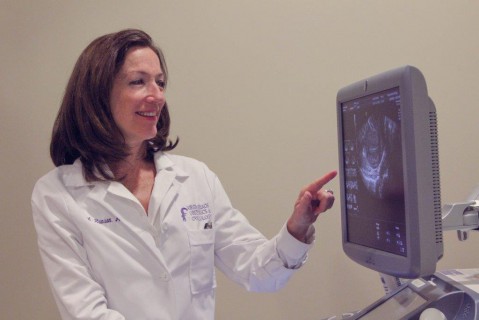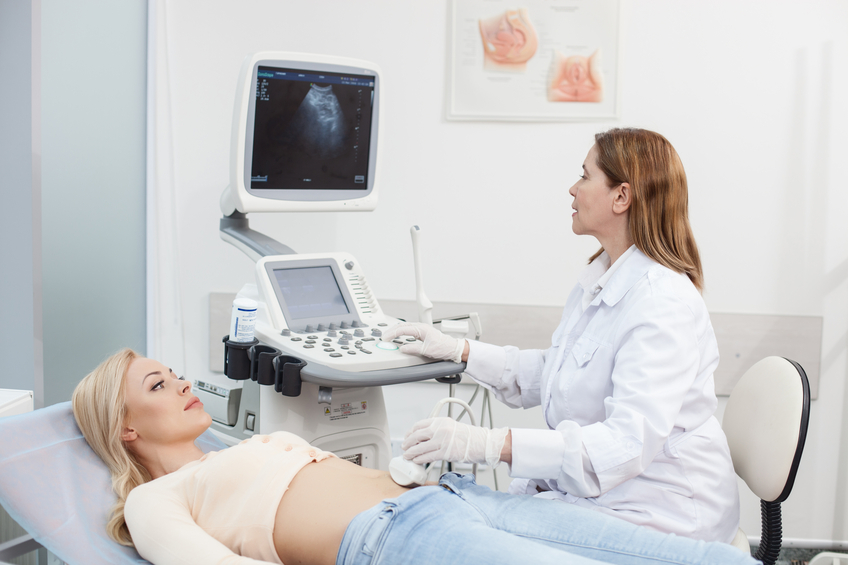 Uterine fibroids are noncancerous growths of the uterus that typically appear during childbearing years. Also called leiomyomas or myomas, these develop from the smooth muscular wall of the uterus. A single cell divides repeatedly, eventually creating a firm rubbery mass distinct from the nearby tissue. They are extremely common. As many as three out of four women will have uterine fibroid sometime during their lives. Many are unaware because they often cause no symptoms.
Uterine fibroids are noncancerous growths of the uterus that typically appear during childbearing years. Also called leiomyomas or myomas, these develop from the smooth muscular wall of the uterus. A single cell divides repeatedly, eventually creating a firm rubbery mass distinct from the nearby tissue. They are extremely common. As many as three out of four women will have uterine fibroid sometime during their lives. Many are unaware because they often cause no symptoms.
Fibroids can range from tiny seedlings to large masses that can distort and enlarge the uterus. Some fibroids grow rapidly, while others grow very slowly over time. Occasionally, fibroids can shrink on their own. Many fibroids that are present during pregnancy may shrink or even disappear after the pregnancy.
SYMPTOMS & DIAGNOSIS
Some women with fibroids suffer from symptoms such as heavy menstrual bleeding, prolonged menstrual periods (seven days or more of menstrual bleeding), pelvic pressure or pain, frequent urination, difficulty emptying the bladder, constipation, backache, or leg pain. The presence of symptoms varies from woman to woman. The fibroid location, siz,e and number may influence signs and symptoms.
Discovering fibroids can occur during a routine pelvic exam. The doctor may detect irregularities that require further testing. An ultrasound exam will provide a picture of the uterus, which may indicate the presence of fibroids. An ultrasound test will also provide a map of where the fibroids are located and their size.
Laboratory tests, including a full blood count, will determine if anemia is present or if there are other issues, such as thyroid problems.
IMAGING SCANS
Other imaging scans can be done if there is still a question on whether the problem is fibroids. An MRI will more distinctly show the size and location of fibroids or any other masses in the uterus. These images will provide the information needed for treatment of fibroids and whether a hysterectomy is indicated.
Patients with infertility can benefit from tests that clearly show the interior of the uterus and the opening to the fallopian tubes. In this way, treatment options can be planned to remove the fibroids and restore fertility if fibroids have prevented pregnancy.
Some additional testing may be indicated if an MRI or an ultrasound has not provided confirmation of the presence of fibroids. A hysterosonography is a test that floods the uterine cavity with sterile saline. This provides a clearer image of the uterus to detect the presence of fibroids. Another similar test uses a special dye to provide contrast between the uterus and the openings to the fallopian tubes.
CAUSES AND TREATMENT OF FIBROIDS
The exact cause of uterine fibroids is unknown, but it is believed to be a combination of genetic factors and hormones. There appears to be a familial predisposition to form fibroids. African American women are much more likely to have fibroids.
Virginia Beach Obstetrics and Gynecology is proud to offer many potential fibroid treatments. We offer medical therapy for the control of menstrual abnormalities, medical therapy for the treatment of fibroids, and surgical removal of fibroids with or without preservation of the uterus for future childbearing.
MEDICATION FOR RELIEF OF FIBROID SYMPTOMS
At Virginia Beach OBGYN, Hysterectomy is not the only treatment we use for a uterine fibroid. Some women might have complications or want to rear children, in which a hysterectomy might not be the procedure of choice. Medication can be very effective in treating these women.
Fibroid treatment can involve the use of medications that regulate the menstrual cycle and shrink fibroids by suppressing estrogen and progesterone. This is often done to shrink fibroids before surgical removal.
Another approach is the use of an intrauterine device (IUD) to deliver progestin, another hormone that regulates the menstrual cycle. This method cannot shrink fibroids but does effectively relieve some symptoms, such as heavy menstrual bleeding.
Other medications that have proven effective are oral contraceptives and anti-inflammatory drugs to relieve pain in the pelvic area. For patients who experience heavy and prolonged bleeding, vitamins and mineral supplements help counter iron loss.
MRI GUIDED THERAPY
Women suffering from fibroids can obtain relief through minimally invasive procedures using ultrasound and laser energy. One newer treatment is performed while the patient is scanned in an MRI machine. In this way, the exact location of the fibroid is found, and the fibroid can be targeted with a special instrument that destroys it.
Other forms of energy can also be used in this way. Laser and electric current have been successfully used to remove fibroids without the need for surgery.

SURGICAL PROCEDURES
Several surgical procedures are commonly used to treat fibroids. Surgery can range from removing small fibroids laparoscopically – through very small incisions using ultra-thin instruments to a full hysterectomy. There are options for women who are planning to become pregnant in the future, which preserve the uterus. At Virginia Beach OBGYN, we treat fibroids with as little medical intervention as possible to attain relief and help you get back to your day-to-day life.
A hysterectomy is a permanent solution to the removal of fibroids, and while it does provide relief from symptoms, it can bring on early menopause if the ovaries are also removed. In all other procedures, there is a risk that fibroids can grow back, but since they are usually slow-growing, this may not be a concern.
BOOK AN APPOINTMENT FOR FIBROID ASSESSMENT
For most women who require fibroid removal (myomectomy) and uterine removal (hysterectomy), we can offer minimally invasive surgery through laparoscopy. If you have uterine fibroids, and particularly if you suffer from bothersome symptoms related to your uterine fibroids, please set up an appointment to discuss with us your treatment options and help create the solution that is right for you.
